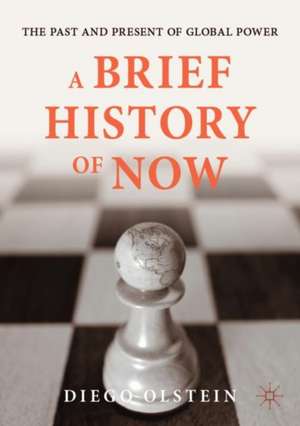A Brief History of Now: The Past and Present of Global Power
Autor Diego Olsteinen Limba Engleză Paperback – 13 oct 2021
Exploring the rise and fall of global power from the mid-nineteenth century, this book tracks the long and interrelated trajectories of the most serious challenges facing the world today. Although at first the urgency of the coronavirus outbreak in 2020 seemed to take precedence over other global problems such as socioeconomic inequality and climate change, it has ultimately exacerbated these issues and created opportunities to address them boldly and innovatively. A Brief History of Now provides a bird’s-eye view of world hegemony, economic globalization and political regimes as they have evolved and developed over the last two hundred years, providing context and insights into the forces which have shaped the Western world. Presented in an accessible and engaging narrative, the book addresses key contemporary challenges and explores the repercussions of a technological revolution, the potential instability of democracy over the coming years, and the urgent struggle to tackle climate change. With his book, Diego Olstein helps to answer pressing questions about our world today and provides a roadmap for analysing future trajectories.
Preț: 214.66 lei
Nou
Puncte Express: 322
Preț estimativ în valută:
41.08€ • 42.83$ • 34.14£
41.08€ • 42.83$ • 34.14£
Carte disponibilă
Livrare economică 28 februarie-14 martie
Livrare express 13-19 februarie pentru 53.73 lei
Preluare comenzi: 021 569.72.76
Specificații
ISBN-13: 9783030824198
ISBN-10: 3030824195
Pagini: 300
Ilustrații: XXI, 364 p. 36 illus., 23 illus. in color.
Dimensiuni: 148 x 210 x 30 mm
Greutate: 0.46 kg
Ediția:1st ed. 2021
Editura: Springer International Publishing
Colecția Palgrave Macmillan
Locul publicării:Cham, Switzerland
ISBN-10: 3030824195
Pagini: 300
Ilustrații: XXI, 364 p. 36 illus., 23 illus. in color.
Dimensiuni: 148 x 210 x 30 mm
Greutate: 0.46 kg
Ediția:1st ed. 2021
Editura: Springer International Publishing
Colecția Palgrave Macmillan
Locul publicării:Cham, Switzerland
Cuprins
1. Introduction: Setting the Framework.- 2. We Were All Brits, 1851-1914.- 3. Until the 'Big Brexit', 1914-45.- 4. When We Became Americans, 1968-73.- 5. Or Else, 1946-73.- 6. Global Citizens All Together Now, 1968-2003.- 7. Falling Apart: A Return to Nationalism, 2003-2020.- 8. Epilogue: The Big Picture - Ongoing Patterns Amidst Convoluted Developments.
Notă biografică
Diego Olstein is Professor and Chair of the Department of History at the University of Pittsburgh, USA. He has published widely on medieval Spain, world history and historiography and taught or lectured on these subjects in North and Latin America, Europe, Israel, India, China, Korea, Japan, Singapore and Australia. Diego’s previous book, Thinking History Globally (Palgrave, 2015), defines, explains and exemplifies twelve transboundary branches of history, and his current interests revolve around globalization and hegemony in world history.
Textul de pe ultima copertă
Exploring the rise and fall of global power from the mid-nineteenth century, this book tracks the long and interrelated trajectories of the most serious challenges facing the world today. Although at first the urgency of the coronavirus outbreak in 2020 seemed to take precedence over other global problems such as socioeconomic inequality and climate change, it has ultimately exacerbated these issues and created opportunities to address them boldly and innovatively. A Brief History of Now provides a bird’s-eye view of world hegemony, economic globalization and political regimes as they have evolved and developed over the last two hundred years, providing context and insights into the forces which have shaped our contemporary world. Presented in an accessible and engaging narrative, the book addresses key contemporary challenges and explores the repercussions of a technological revolution, the potential instability of democracy over the coming years, and the urgent struggle to tackle climate change. With his book, Diego Olstein helps to answer pressing questions about our world today and provides a roadmap for analysing future trajectories.
Caracteristici
Presents a roadmap for exploring key issues impacting the world today Covers challenges including technological innovation, economic globalization and climate change Identifies and evaluate generalised trends and patterns throughout history
